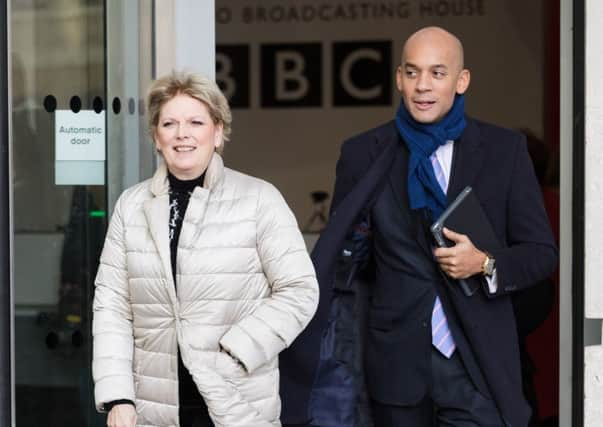Tom Peterkin: The people who can save UK from political extremes


The late Lothario Alan Clark used to have a bit of a political thing about David Owen, the former Labour Foreign Secretary who famously quit his party as one of the “gang of four” who set up the Social Democratic Party (SDP).
It was the Tory MP’s firm belief that Dr Owen would have made an excellent leader of the Tory Party. Never mind that Dr Owen did not share Mr Clark’s often highly questionable hard-right views. It was simply that the famously indiscreet diarist liked the cut of Dr Owen’s jib. “Policies don’t matter, it’s all about personalities,” was Mr Clark’s view.
Advertisement
Hide AdAdvertisement
Hide AdThe roguish Tory’s mutterings in praise of Dr Owen became so loud that the SDP politician felt compelled to make a public statement on the matter.
Having left Labour to form the SDP, Dr Owen made it known that his political promiscuity did not extend to joining the Conservative Party.
As someone whose infidelities in his not-so-private life were legendary, perhaps Mr Clark’s grasp of the concept of loyalty was not all it could have been.
Three decades after Mr Clark was urging Dr Owen to “cross the floor” to the Tories, the question of loyalty – political loyalty at least – has become a major talking point.
The reason being that a new political party – complete with £50 million funding – has been created with the hope of straining traditional party loyalties to breaking point.
The cash comes from a group of philanthropists and donors led by the former Labour benefactor Simon Franks, the multi-millionaire founder of LoveFilm.
Fed up with the tribal nature of politics, they want to “break the Westminster mould” by forming a new centrist party to shake things up. In a political system that has been dominated by two parties for almost all of its existence, the challenges faced by this new enterprise are considerable.
Anyone wanting to learn about the difficulties of challenging the Conservative and Labour stranglehold on the Houses of Parliament could do worse than have a word with Dr (now Lord) Owen. Despite enormous hopes and high expectations, his SDP eventually slid into obscurity. But despite the barriers faced by new political projects, there are good reasons for the people behind Mr Franks’ venture to be more positive.
Advertisement
Hide AdAdvertisement
Hide AdThe political earthquakes that have shaken the UK in recent years – in particular the Brexit vote – mean that we are in fertile territory when it comes to giving the age-old system a kick in the pants.
The new – and as yet unnamed – political venture has been greeted with derision from old Labour-types, who see it as a plaything for the rich elite. But its founders clearly see a sizeable gap in the market.
It is a gap down the middle that has been created by the shift in the Labour Party to the left under Jeremy Corbyn and John McDonnell and a Conservative Party enthralled to their Eurosceptic wing and the likes of Jacob Rees-Mogg.
The move to the extremes has left many centre-ground voters feeling disenfranchised. While Labour members and politicians, in particular, are feeling disaffected.
That feeling has been exacerbated by the party’s problem with anti-semitism, dismay at Mr Corbyn’s reaction to the Salisbury poisoning and the Labour leadership’s approach to Brexit. Moderate and disillusioned Labourites are already doing the maths. Playing a game of fantasy politics, they reckon that there could between 70 and 100 Labour MPs who could be persuaded to desert Mr Corbyn and leap to the new party. They could be joined by the 12 Lib Dem MPs, who would welcome the new faces in the centre ground because their brand is still struggling to shrug off the damage caused by going into coalition with the Tories.
Then there could be up to 18 Tory Europhiles, like Ken Clarke and Anna Soubry, who might be attracted to the new party’s hope of re-establishing the UK’s relationship with the European Union or to secure at least a very soft Brexit.
Leaping into bed with the Tories may have been taboo for any self-respecting Labour politician in the past. But these are strange times. Nowadays, it is not unreasonable to think that politicians like the Labour moderates Yvette Cooper and Chuka Umanna have more in common with Mr Clarke and Ms Soubry than they do with Mr Corbyn and Mr McDonnell. Of course there would be substantial barriers to be overcome. As the former Labour adviser Ayesha Hazarika argued elegantly in these pages yesterday, the first-past-the-post electoral system stands in the way of any new political enterprise making progress. In 1983, Dr Owen’s SDP/Liberal Alliance polled 25.4 per cent of the vote (just behind Labour) but only took 23 seats. On the plus side this would be an enterprise with multi-million-pound war chest. If it could attract 100 MPs, it would become the third largest party, would get a question at Prime Minister’s Questions plus the substantial short-money payments to which opposition parties are entitled.
Should characters like Mr Clarke, Ms Soubry, Ms Cooper, Mr Umanna and Vince Cable display some political promiscuity and choose to get involved, they might have the force of personality to overcome deeply entrenched tribal loyalties. Granted, the challenges ahead are substantial. Breaking the mould will be far from easy. But somehow one can’t help feeling that if there is to be a new centrist movement, it is now or never.
